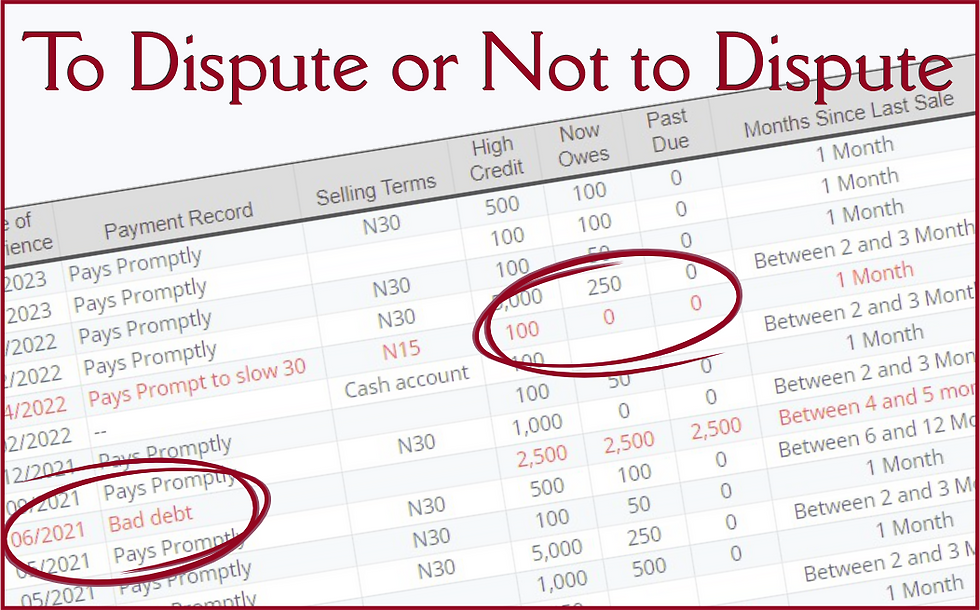Don't Cheat Your Payment History
- Joy Greenwood
- Feb 27, 2017
- 3 min read
Updated: Feb 3, 2022
Do you think "it takes money to make money" translates to "it takes credit to make credit?" If so, you may be cheating yourself and your business by not building upon your new or existing payment history.
There are lots of ways to boost your credit potential by simply adding new payment history to your credit file using the purchases and payments you are already making. Whether you buy online, in a major department store, from a trusted vendor or point-of-sale, if you don't know these basic strategies, you could lose out on great credit-boosting opportunities that won't cost you a penny!

Simple Strategies to Make the Most of New Payment History
1) Open accounts with all your suppliers, even if they require you to prepay for your online purchases. Many large companies report payment history to the business credit bureaus on all their corporate accounts, even those that are prepaid or COD. If you create an account in your business name and then place your order in person or online, the purchase gets entered into a specialized tracking system so it can get reported to the bureaus. Personal transactions get reported to the consumer credit bureaus and business transactions get reported to the commercial credit bureaus. If you don't point it in the right direction, your purchase is assumed to be for personal use.
2) Buy before you "fly" to make your purchase online before you drive to the store to pick it up. This allows the order and payment to be associated to your business and gives you the convenience of having access to your product the day you buy it. If you are making your purchase as a point-of-sale transaction, it isn't getting linked to your business in any way.
3) Get two transactions reporting for the price of one by paying for your purchase using your business credit card. Not only will your supplier report the purchase to the bureaus, but your credit card company will also report a new balance. Even if your credit card company is already a reporter on your credit report, new transactions help to continuously boost credit scores by verifying ongoing activity for your business.
4) If you don't yet have a non-personally guaranteed business credit card, you should be paying for your purchases using a business check or debit card so it doesn't get mistaken for a personal transaction. It will do you no good to buy in the business name and then pay for your purchase with a personal payment method. Many suppliers track and provide these payment details to the bureaus as a way of filtering which customers get reported to the business bureaus and which should get reported to the personal bureaus. Remember, if your credit card is personally guaranteed, payments may not be allowed into the business credit report.
5) Use resources that confirm they will auto-report your payment history to the bureaus. There are hundreds of businesses who either report directly to the commercial credit bureaus or are underwritten by financial providers who report for them. Most telephone customer service agents won't be able to legitimately answer the question, so you should contact the billing department for your vendor directly and ask if they report to the bureaus. If they can't or won't report, choose companies who have already confirmed they have auto-reporting procedures in place.
6) Use a variety of suppliers for like products to help generate new payment history. Whether you purchase office supplies, paint, tires, or food, buying from multiple sources increases the reporting of your payment history, but also provides some lift to other business credit scores by diversifying suppliers. If you only use one supplier and their credit report is going downhill, it is assumed your business will suffer by association.
7) Synchronize your corporate details. Each of your vendors and suppliers should see you with the same name and in the same location. Your corporate details should match across all platforms — with your D&B file, your invoices, your banking and payment methods, your shipping details, and your web presence.
These are just seven suggestions that can make your everyday purchases work to your benefit by changing the way you shop, buy, ship, and then pay. If you think about what your business is already spending money on (gas, office supplies, paint, tires, food, chemicals, windows) and how you are already paying for those purchases (cash, check, or credit) you should have no problem getting strong payment history added to your file.




Comments